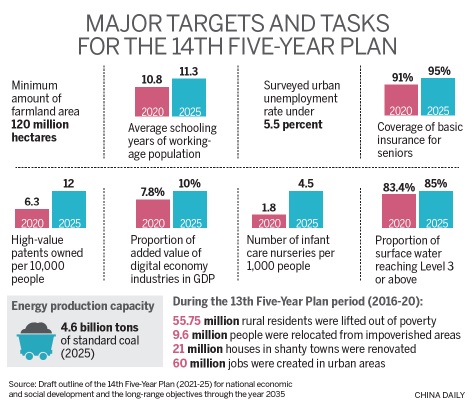Nation shows resolve to further integrate with global economy


China's pragmatic opening-up measures released in the draft 14th Five-Year Plan (2021-25) have fully demonstrated the country's resolve to further integrate with and contribute to the world economy, officials and experts said on Friday.
In the draft Outline for the 14th Five-Year Plan for Economic and Social Development and Long-Range Objectives Through the Year 2035, China has vowed to unswervingly open its economy wider, further promote the free flow of production factors and expand institutional opening-up in the coming five years.
The country must leverage its domestic market to create strong gravitation for global factors and resources in the coming five years, as part of efforts to build the new dual-circulation development paradigm, in which the domestic market is the mainstay while the domestic and international markets support each other, Xinhua News Agency reported the outline as saying on Friday.
Premier Li Keqiang outlined specific opening-up measures for this year, the start of the 14th Five-Year Plan period, including further reducing the negative list for foreign investment, opening the service sector in a well-regulated way, formulating a negative list for cross-border trade in services and advancing the development of the Hainan Free Trade Port.
Li made the announcement when delivering the Government Work Report at the opening of the fourth session of the 13th National People's Congress. It was the second day of the two sessions, the annual meetings of China's top legislative and political advisory bodies.
Zhang Xiaotao, dean of the School of International Economics and Trade at the Central University of Finance and Economics in Beijing, said, "Faced with protectionism and the COVID-19-induced economic recession, China has rolled out new, pragmatic opening-up measures that will support globalization."
As China implements the dual-circulation paradigm and steps up efforts to expand its domestic market, which already has more than 400 million middle-income residents, progress in opening-up has provided global businesses with huge investment opportunities, Zhang said.
Li Jian, managing director of global consulting firm AlixPartners' Shanghai office, said the efforts to strengthen domestic circulation do not only mean growing market demand from China, but an easier and more competitive business environment to enable the upgrading of the supply system.
The latter also represents more investment opportunities in China for foreign businesses, Li Jian said, but they may need to prepare for stronger competition from domestic players as the domestic supply system improves.
The premier said the country will promote the steady growth of imports and exports this year, increase credit support to small and medium-sized foreign trade firms and encourage the development of new trade forms such as cross-border e-commerce.
China will also work to make the Regional Comprehensive Economic Partnership agreement come into force as soon as possible, facilitate the signing of its investment deal with the European Union, and accelerate its free trade negotiations with Japan and South Korea, he added.
Wu Kai, Airwallex's Greater China CEO, said the multinational fintech company is encouraged by the government's latest pledge to stabilize foreign trade, and has seen great opportunities in cooperation with Chinese cross-border e-commerce businesses on innovative cross-border payment services.
"With China's high-quality development and supportive policies, including financial opening-up, Airwallex and other fintech companies will see greater development prospects here," Wu said.
Cheng Shi, chief economist at ICBC International, said China's plan to further consolidate the fruits of the RCEP and the China-EU investment deal will help drive regional economic integration and global economic recovery.
Officials and experts said China's dual-circulation strategy that emphasizes the role of the domestic market is not contradictory with its aim to further integrate with the global economy, as the domestic and international markets are interdependent and mutually enhancing.
"The new development paradigm is by no means a closed, internal cycle, but about two circulations working together in an open and mutually reinforcing way," said Zhang Yesui, spokesman for the fourth session of the 13th NPC.
"It aims to tap into the potential of domestic demand so that the Chinese and global markets can be better connected, to leverage internal circulation to attract global resources, and to better harness the two markets and their resources," Zhang said at a news conference on Thursday.
Iris Pang, chief China economist at Dutch bank ING, said China is expected to become "more interlinked" with the rest of the world as the country implements the dual-circulation paradigm in the 14th Five-Year Plan period.
This would result from more bilateral investment as China's stronger domestic market attracts increased foreign investment, while Chinese companies continue to explore overseas investment opportunities, Pang said.
- Spring Festival travel expected to reach record high
- C919 begins Shanghai-HK regular flight
- Mount Qomolangma's foreign tourist number doubles in 2024
- Yuyuan Garden lights up with Year of the Snake lantern installations
- New dendrobium orchid species found in Sichuan
- People welcome the New Year across China





































